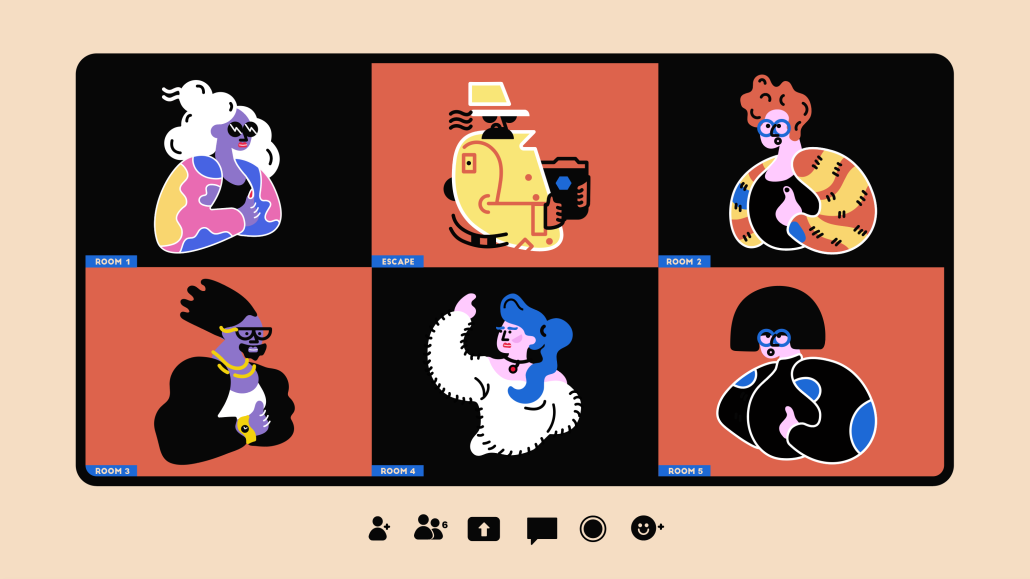Save 50% on a 3-month Digiday+ membership. Ends Dec 5.
‘Managers need to know someone is engaged’: Getting noticed virtually has gotten harder

When it comes to getting noticed by the boss, virtual working can be a nightmare.
The coronavirus crisis and the switch to remote working and meetings has made it more difficult for employees to stand out, especially for those who are quiet and introspective.
While extroverts gain energy from social interactions online or face to face, more introverted people can miss out on selection for a project team or being shortlisted for promotion because their efforts go unnoticed.
Occupational psychologist Kirsten Godfrey, author of the blog ‘A work of thought,’ believes the online environment has made it harder for introverts to fight their corner. In a physical office it can be straightforward to grab a quick word with a manager to discuss an issue. Finding the right moment to share an important thought during a conference call on Teams or Zoom is not so easy.
“Introverts are more likely in a group setting to sit and soak up what is being said and process their thoughts before taking an appropriate moment to say something,” said Godfrey. “This is often perceived as being shy or not interested, but they are just more reserved.”
Godfrey said anyone who fears they are not being noticed should offer to chair online meetings or agree with a manager that at the end of each get-together there is time for everyone to have a final input. “Ask for an agenda in advance so you can prepare,” she added. “This isn’t about being less of an introvert, it’s about adapting slightly to make the situation work for you.”
Rhonda George-Denniston, global director of talent development at ad agency TBWA\Worldwide based in New York, agrees. She said everyone needs to play to the extroverted strengths they do possess, however hard that might be. “This means doing what introverts do best: Make deep and meaningful connections one workmate at a time,” she said.
Ad position: web_incontent_pos1
George-Denniston added that while some people may lose ground at work because they are not having casual interactions with their colleagues and boss, being at home does provide different opportunities. Individuals can demonstrate how they are delivering quality work at a faster pace because they are not jostling co-workers for a meeting room or quiet space in the office.
Nikki Hawke, CMO at Montreal-based global digital out-of-home ad tech firm Hivestack, has managed staff remotely for years and said ensuring no-one is unwittingly ignored can be a challenge.
“When I began at Hivestack in August there was one employee who reported to me who I noticed immediately. She was well-presented online, demonstrated she was a team player and had her camera on during virtual meetings,” said Hawke. “I have had to coach other people to understand the importance of these things because managers need to know someone is engaged. They need to see who the problem solvers are and who can communicate effectively.”
Using collaborative tools such as Slack has helped the quieter members of Hawke’s team. The company also organizes social events on Zoom so people from across the company can interact.
“When we go back to the office we need to make sure that those who still prefer to work at home are not left out. There will be a return to drinks after work and face-to-face networking events, and conversations that started during online meetings will continue afterwards.”
Ad position: web_incontent_pos2
Ultimately it comes down to the management style and culture of each organization whether people are unintentionally overlooked. Managers must be aware of each individual’s personality type and not only acknowledge their output but also appreciate what someone working at home could offer. They might be ideal for a project or vacant role, even if they haven’t openly expressed an interest.
Cindy Machles, CEO at Glue Advertising and Public Relations, agrees it is the responsibility of senior leaders to ensure everyone remains visible.
“This requires diligence from the top,” she said. “I speak to senior leaders by phone and in one-on-ones at least weekly, and my direct reports are in contact with their team members throughout the day. It is their recommendations that guide promotions, raises and bonuses.”
Glue holds online status meetings on a Monday where every team member is asked to discuss projects and mention where they would like support.
“These sessions are critical for camaraderie and recognition,” said Machles. “Everybody speaks, so everybody gets noticed regardless of personality type. We also have brainstorming sessions where we proactively look at client businesses as a broader group. These help feed the creative process.”
More in Media

What publishers are wishing for this holiday season: End AI scraping and determine AI-powered audience value
Publishers want a fair, structured, regulated AI environment and they also want to define what the next decade of audience metrics looks like.

Digiday+ Research Subscription Index 2025: Subscription strategies from Bloomberg, The New York Times, Vox and others
Digiday’s third annual Subscription Index examines and measures publishers’ subscription strategies to identify common approaches and key tactics among Bloomberg, The New York Times, Vox and others.

From lawsuits to lobbying: How publishers are fighting AI
We may be closing out 2025, but publishers aren’t retreating from the battle of AI search — some are escalating it, and they expect the fight to stretch deep into 2026.
Ad position: web_bfu




